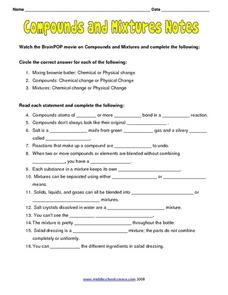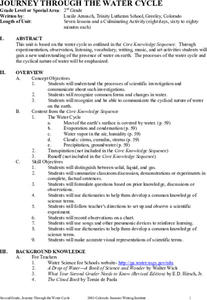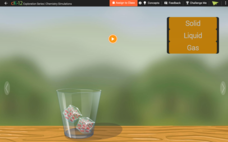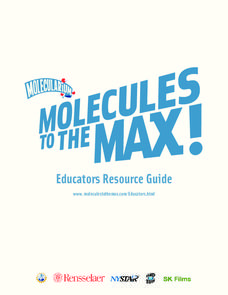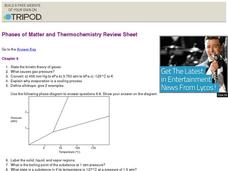Curated OER
Quick Freeze (Demonstration)
Students witness an demonstration in which a bottle of club soda will go from a liquid to a solid when it is opened and the carbon dioxide is allowed to escape. This will help them understand that the freezing point of a solution will...
Curated OER
Space Shuttle Science
Students study the nomenclature, operation and purpose of America's Space Transportation system. They demonstrate how water can be broken down into its component gases of hydrogen and oxygen by electrolysis. They construct and use the...
Curated OER
Density - An Introduction
Students experiment with objects of different densities. In this density lesson, students examine same-sized objects with different weights, then look at a teacher explanation of density. Students make wave bottles and a density jar to...
Curated OER
Facts of Matter
Students make group decisions about matter as they explore and interpret many types.
Curated OER
What's the Matter?
Students investigate matter. For this matter lesson, students identify types of matter and characteristics of each type. Students discuss matter and create matter posters to show understanding.
Curated OER
Compounds and Mixtures Notes
In this matter learning exercise, students watch a movie and then compare the differences between compounds and mixtures. This learning exercise has 16 fill in the blank questions.
Curated OER
Journey Through the Water Cycle
Students canvass the water cycle in the seven lessons of this unit. The processes of the water cycle and the cyclical nature of water is emphasized inthis unit.
Curated OER
Unit 1 Matter and Energy
Topping this worksheet is a comprehensive collection of notes about phase changes. The phase change graph is displayed, along with formulas for the gas laws, and information relating energy to change of phase. After reviewing these...
US Geological Survey
The Water Cycle — A Placemat for Kids
What better time to reinforce a concept than when you're eating? Boost scholars' knowledge of the water cycle with an eye-catching placemat featuring playful raindrops and bright colors.
PBS
The 3 Phases | Phases of Matter | UNC-TV Science
Explore the states of matter without the mess or expensive equipment in a compact, informative activity. Scientists watch as the narrator explains the three states of matter using a glass of ice and soda in an animated video that...
PBS
Phase Changes | Phases of Matter | UNC-TV Science
Take an energetic ride through the phase changes of a water molecule in a compact activity. Young scientists learn about the phases of matter and discover the role of thermal energy in governing phase changes while watching a short...
CK-12 Foundation
It's Just a Phase
Explore the phases of water as temperature rises. Pupils consider the idea that temperature remains constant during each phase change. An interactive exercise allows your young scientists to observe the temperature and molecular motion...
CK-12 Foundation
What's the Matter?
What makes ice, water, and steam different? Their molecular arrangements are the same, but their movements are different. Individuals make this conclusion by completing the simulation activity.
Rensselaer Polytechnic Institute
Molecules to the Max!—Educators Resource Guide
From molecules to nanotubes, an engaging unit explores the world of tiny science. Fifteen hands-on experiments and lessons engage young scientists as they learn chemistry. Discussions, worksheets, and data analysis reinforce the concepts...
American Chemical Society
Matter Is Made of Tiny Particles
Believe in the invisible and convince the class that tiny particles exist even if they can't see them! A thorough lesson investigates all phases of matter and provides pupils hands-on experiences that demonstrate that all matter is made...
Curated OER
Melt the Ice
Students examine and discuss how water changes from a liquid to a solid to a gas. They explore this concept by having an ice cube race, competing to see which group can change the solid water back into liquid water first.
Curated OER
Phases of Matter and Thermochemistry
In this theromochemistry worksheet, students review the kinetic theory of gases and the three phases of a substance. Students calculate how much heat is required to raise a certain mass of solution a certain number of degrees. This...
Curated OER
Matter in Motion
Second graders examine matter, what it is and what the different states are. In this matter activity students view The Magic School Bus Meets Molly Cule and answer questions.
Curated OER
What Are Three States of Matter?
In this states of matter worksheet, students will write down a main idea relating to the three states of matter. Then students will write in five supporting details in this graphic organizer.
Curated OER
What is a Physical Change in Matter?
In this matter worksheet, students complete a graphic organizer by writing in 1 thing that causes a physical change in matter and 3 effects this has on matter.
Curated OER
What Are Physical Changes in Matter?
In this matter worksheet, students write down 3 causes and effects of physical changes in matter. This worksheet is a graphic organizer.
Curated OER
The Scientific Method
In this scientific method worksheet, students read about the steps of the scientific method, ways to measure mass and volume and how to read a meniscus. Students use the scientific method to determine if an object is a liquid or a solid...
Curated OER
Motion in Fluids
Pupils explore physical science by participating in a science activity. In this liquids lesson, students discuss how fluids can be affected by motion unlike solids. Pupils define other scientific vocabulary terms and conduct a motion...
Curated OER
The Ideal Gas
In this ideal gas worksheet, students read about the conditions necessary for an ideal gas to exist. They also read about the deviations from the ideal gas situation and answer four questions about ideal gases.
Other popular searches
- Liquids Solids and Gases
- Solids Liquids Gases Quiz
- Matter Solids Liquids Gases
- Science Solids Liquids Gases
- Liquids Solids Gases
- Nature Liquids Solids Gases
- Liquids, Solids and Gases







